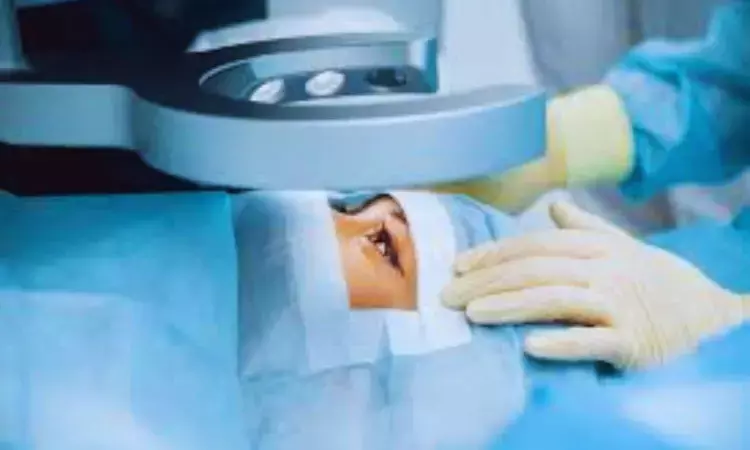- Home
- Medical news & Guidelines
- Anesthesiology
- Cardiology and CTVS
- Critical Care
- Dentistry
- Dermatology
- Diabetes and Endocrinology
- ENT
- Gastroenterology
- Medicine
- Nephrology
- Neurology
- Obstretics-Gynaecology
- Oncology
- Ophthalmology
- Orthopaedics
- Pediatrics-Neonatology
- Psychiatry
- Pulmonology
- Radiology
- Surgery
- Urology
- Laboratory Medicine
- Diet
- Nursing
- Paramedical
- Physiotherapy
- Health news
- Fact Check
- Bone Health Fact Check
- Brain Health Fact Check
- Cancer Related Fact Check
- Child Care Fact Check
- Dental and oral health fact check
- Diabetes and metabolic health fact check
- Diet and Nutrition Fact Check
- Eye and ENT Care Fact Check
- Fitness fact check
- Gut health fact check
- Heart health fact check
- Kidney health fact check
- Medical education fact check
- Men's health fact check
- Respiratory fact check
- Skin and hair care fact check
- Vaccine and Immunization fact check
- Women's health fact check
- AYUSH
- State News
- Andaman and Nicobar Islands
- Andhra Pradesh
- Arunachal Pradesh
- Assam
- Bihar
- Chandigarh
- Chattisgarh
- Dadra and Nagar Haveli
- Daman and Diu
- Delhi
- Goa
- Gujarat
- Haryana
- Himachal Pradesh
- Jammu & Kashmir
- Jharkhand
- Karnataka
- Kerala
- Ladakh
- Lakshadweep
- Madhya Pradesh
- Maharashtra
- Manipur
- Meghalaya
- Mizoram
- Nagaland
- Odisha
- Puducherry
- Punjab
- Rajasthan
- Sikkim
- Tamil Nadu
- Telangana
- Tripura
- Uttar Pradesh
- Uttrakhand
- West Bengal
- Medical Education
- Industry
Vision may improve after cataract surgery in retinitis pigmentosa patients

A recent study by Michalis Georgiou and colleagues analyzed the outcomes of cataract surgery in the eyes afflicted with retinitis pigmentosa (RP) which is a hereditary eye condition that leads to progressive vision loss. The findings were published in the recent issue of the American Journal of Ophthalmology, that compared the efficacy of cataract surgery in improving visual acuity (VA) in RP-affected eyes with the non-RP-affected ones.
The retrospective clinical cohort study was conducted across eight clinical sites in the United Kingdom and comprised a total of 113,389 eyes that underwent cataract surgery from December 2010 to December 2014. Among the eyes, 72 were diagnosed with RP as the only comorbid pathology. The RP patients were significantly younger, with a mean age of 57 when compared to 75 in the control group.
This study observed a significant disparity in VA outcomes between the two groups. The preoperative and postoperative VA scores were inferior in RP eyes. The cataract surgery demonstrated a significant improvement in the vision for RP patients, but just to a lesser extent than non-RP individuals.
The intraoperative complications such as pupil expansion use and capsular tears showed no significant differences between RP and control eyes, while postoperative complications varied. RP eyes expressed an increased incidence of cystoid macular edema which occurred in 6.9% of cases when compared to 1% in controls.
Despite these challenges, the outcomes of this comprehensive research underscore the transformative potential of cataract surgery to enhance vision for RP patients. Further research and innovations will help ophthalmologists to optimize their treatment strategies and additionally empower the RP patients to reclaim their visual capability and quality of life.
Reference:
Georgiou, M., Shakarchi, A. F., Elhusseiny, A. M., Michaelides, M., & Sallam, A. B. (2024). Cataract Surgery Outcomes in Retinitis Pigmentosa A Comparative Clinical Database Study. In American Journal of Ophthalmology. Elsevier BV. https://doi.org/10.1016/j.ajo.2024.01.037
Neuroscience Masters graduate
Jacinthlyn Sylvia, a Neuroscience Master's graduate from Chennai has worked extensively in deciphering the neurobiology of cognition and motor control in aging. She also has spread-out exposure to Neurosurgery from her Bachelor’s. She is currently involved in active Neuro-Oncology research. She is an upcoming neuroscientist with a fiery passion for writing. Her news cover at Medical Dialogues feature recent discoveries and updates from the healthcare and biomedical research fields. She can be reached at editorial@medicaldialogues.in
Dr Kamal Kant Kohli-MBBS, DTCD- a chest specialist with more than 30 years of practice and a flair for writing clinical articles, Dr Kamal Kant Kohli joined Medical Dialogues as a Chief Editor of Medical News. Besides writing articles, as an editor, he proofreads and verifies all the medical content published on Medical Dialogues including those coming from journals, studies,medical conferences,guidelines etc. Email: drkohli@medicaldialogues.in. Contact no. 011-43720751


